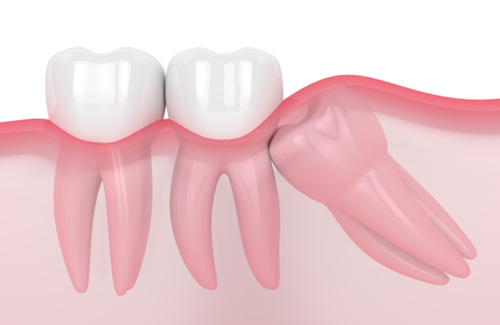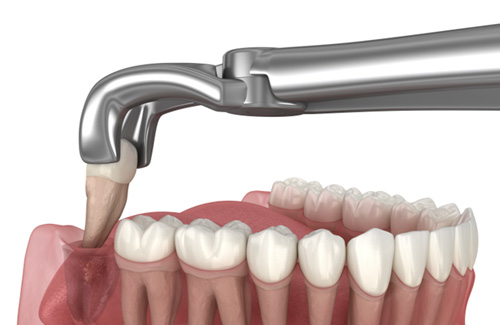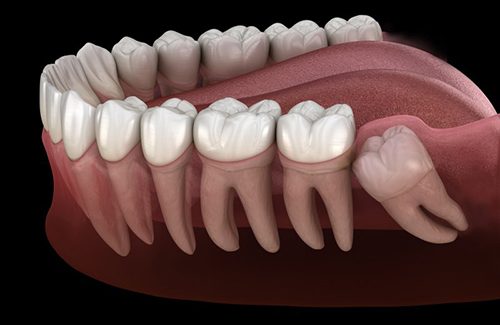Wisdom Tooth Extractions – Orem, UT
Removing Teeth That You Don’t Need
Wisdom tooth removal is so common nowadays that it’s viewed as a rite of passage. Even so, you might not know very much about it, including what to expect in the treatment chair. Don’t worry – we’re here to help! From scheduling your initial appointment to healing comfortably at home, our team at Frandsen Dental of Orem is here to make sure that the process goes smoothly. Please give us a call if someone in your family is around the right age for wisdom teeth; we can check to see whether wisdom tooth extractions in Orem may be necessary in the near future.
Why Choose Frandsen Dental of Orem for Wisdom Tooth Extractions?
- Extractions Performed by Experienced Dentist
- Sedation Options for Nervous Patients
- State-of-the-Art Dental Technology
What are Wisdom Teeth?

In short, wisdom teeth are the third set of molars. It is believed that they earned their nickname due to the time they make an appearance (usually in the late teens or early 20s). However, most patients don’t need theirs. In fact, they are often more harmful than helpful. If that’s the case for you, then we will recommend having them removed.
Why Do Wisdom Teeth Need to Be Removed?

Unfortunately, wisdom teeth don’t always grow in straight, and many patients don’t have enough room in their mouth to accommodate the third set of molars. That’s why we monitor their development with early X-rays! If we determine that they do pose a threat to your oral health, it is best to have them taken out of your mouth as soon as possible.
It’s also worth noting that impacted or partially erupted wisdom teeth are known to cause pain and a variety of oral health issues. If we can act quickly, we can remove them, alleviate your discomfort, and get your oral health back on-track.
What to Expect from the Wisdom Teeth Procedure

If your wisdom teeth have managed to partially emerge from beneath your gums, we may be able to extract them with forceps as well as an instrument known as a dental elevator. For this type of extraction, the tooth or teeth in question will be gently rocked back and forth until they are loosened to the point where they can be taken out of the socket.
Impacted wisdom teeth, on the other hand, need to be removed via surgery. Incisions will have to be made in your gum tissue, and it may be necessary for us to take the teeth out in sections. Rest assured that your mouth will be numbed beforehand, ensuring you don’t experience any pain or discomfort in the process.
Recovering from Wisdom Teeth Extraction

To help you heal quickly and comfortably, we will provide you with aftercare instructions. Some general ones include:
- Taking prescribed or OTC pain medication as directed
- Brushing and flossing carefully around the extraction site
- Eating only soft foods, like applesauce, pudding, and plain yogurt
- Drinking water to stay hydrated (don’t use a straw!)
- Not smoking, spitting, or drinking alcohol
Understanding the Cost of Wisdom Tooth Extractions

Wisdom tooth extraction is often the best way to restore a person’s comfort and prevent a host of oral health issues like crowding, teeth grinding, oral infections, and TMJ imbalances, but it’s perfectly reasonable to want to know how much it will cost before committing to it. At Frandsen Dental, the team will be sure to provide you with a detailed cost estimate during your consultation. To give you an idea of how that process works, here’s a brief guide to the factors that determine most of the cost of wisdom tooth extractions.
Factors That Impact the Cost of Wisdom Tooth Extractions

Several principal factors make up most of the cost of wisdom tooth extraction. These include:
- The number of wisdom teeth: Each tooth removed will be noted on your bill. Some people are born three, two, one or no wisdom teeth, and these individuals will not need as many extractions.
- The complexity of the case: Wisdom teeth that fail to emerge from the gums properly are impacted, and this significantly increases the risk of discomfort and oral infections. Impacted teeth are harder and more costly to remove.
- Anesthesia: Wisdom tooth extraction will only be performed after the patient receives anesthesia and possibly sedation. The cost of these treatments will be represented on your bill.
- The need for a specialist: For especially complex cases, some dentists will refer their patients to a specialist who uses a different pricing structure. At Frandsen Dental, we are equipped to perform complex extractions at our office.
Does Dental Insurance Cover Wisdom Tooth Extractions?

While tooth extractions are not covered by all dental insurance policies, most will cover wisdom tooth removal at least partially. However, this will depend on factors like whether you have met your deductible or maximum for the year. The team at Frandsen dental will be happy to help you navigate your insurance plan and determine exactly what it will pay for before you commit to the treatment.
How to Make Wisdom Tooth Extractions Affordable

The team at Frandsen Dental understands that many uninsured or underinsured patients will need wisdom tooth extractions to preserve their oral health and restore their comfort. To make sure this treatment is as accessible as possible, we offer several options that can make the procedure more affordable. These include:
- CareCredit financing: Our partners at CareCredit may be able to set you up with a flexible payment plan that breaks your bill into monthly installments with little or no interest.
- Our In-house membership plan: For a low fee of $249 and $199 to renew, you can have all your preventative care for the year covered at our office. This package also includes 20% to 60% off all other services and a $899 special for wisdom teeth extractions including sedation.
Wisdom Tooth Extraction FAQs
Does Wisdom Tooth Removal Hurt?
The very first thing we’ll do during your wisdom tooth surgery is sedate you and numb your mouth with a local anesthetic, so pain isn’t something that you need to worry about at all. That said, you may feel some slight pressure as your teeth are rocked back and forth, but it won’t be outright painful. Some soreness and general discomfort are also expected following your procedure, but assuming you follow the aftercare guidelines you’re given, this can be minimized and managed comfortably. You should feel back to normal within about a week or so; if your discomfort continues to linger, don’t hesitate to contact us.
How Long Does Wisdom Tooth Surgery Take?
On average, it takes about 15 to 20 minutes to extract one wisdom tooth, meaning that removing all four normally takes about an hour and a half. However, the time it takes can also vary, depending on the location of the teeth and their relative position, whether or not they’re impacted, etc. Our team will be able to give you an accurate estimate of how long your procedure should take; however, in any case, the time spent in the treatment chair should pass quickly for you since you’ll be sedated!
Why Do We Have Wisdom Teeth?
Your wisdom teeth might seem like more trouble than they’re worth, but believe it or not, they used to serve an important purpose for our ancestors. Since early humans ate a very coarse diet that consisted of several raw foods like meats, berries, roots, nuts, and other earthy items, and since they didn’t cook or slice up their food like we do today, their jaws needed to be much broader and stronger. Our bodies evolved to grow a third set of molars to compensate for our diets; however, modern food is much softer and easier to eat. Wisdom teeth simply aren’t needed anymore—and now our jaws have evolved to typically not have room for them. Now, it’s usually best to remove them and avoid any potential problems they may lead to.
What Can I Do to Prepare for Wisdom Tooth Extraction?
Even though wisdom tooth extraction is one of the most common and straightforward forms of oral surgery, you may still be wondering what you can do to prepare yourself. You should arrange to have someone drive you to and from your appointment, since you won’t be fit to drive after receiving sedation or anesthesia. It’s also smart to have them keep an eye on you for a few hours following the procedure. Consider wearing loose, comfortable clothing to your appointment, and if you have any questions before the surgery, don’t hesitate to bring them with you or call ahead. You can also stock up beforehand on soft and liquid foods, since you’ll need them for the next few days—and likely won’t feel up for a trip to the store!
